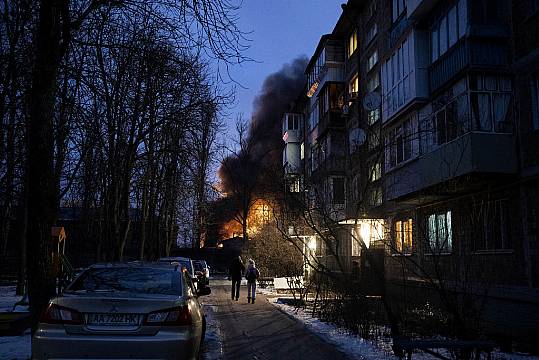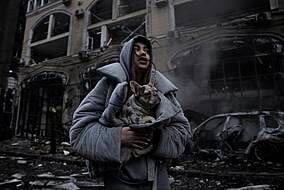Ukraine’s capital has been targeted by multiple drone attacks, authorities reported.
The strike comes three days after what officials described as one of Russia’s biggest assaults on Kyiv since the beginning of the war.
The Kyiv city administration said on its Telegram account that more than 20 Iranian-made drones were detected over the capital’s air space and at least 15 of them were shot down.

It added that a critical infrastructure point had been hit.
Kyiv region governor Oleksii Kuleba said on Telegram that some infrastructure facilities were damaged, as well as private houses, and at least two people were injured.
The capital’s mayor Vitali Klitschko said that explosions were heard in two districts, Shevchenkivskyi and Solomianskyi.
He said also on Telegram that there were no immediate casualties reported, and that the emergency services are working in the area.

Although the capital seemed the main target of the latest Russian attack, the armed forces said that other places in the country were also targeted.
Ukraine’s air force said on Telegram that they were able to destroy 30 of at least 35 self-exploding drones that Russia launched across the country from the eastern side of the Azov Sea.
The Ukrainian military has reported increasing success in shooting down missiles and explosive drones.
Russia has been targeting energy infrastructure, including in Kyiv, as part of a strategy to try to freeze Ukrainians.
On Friday, Ukraine’s capital was attacked as part of a massive strike from Russia.

Dozens of missiles were launched across the country, triggering widespread power outages.
Meanwhile, Russian President Vladimir Putin is preparing to visit key ally Belarus, which provided the Kremlin’s forces with a launchpad for its invasion of Ukraine almost 10 months ago.
Mr Putin is travelling to for talks with Belarus’s authoritarian leader, Alexander Lukashenko.
Analysts say the Kremlin might look again for some kind of Belarusian military support for its Ukraine operations. But the winter weather and Russia’s depleted resources mean any attack will probably not come any time soon, according to the Washington-based Institute for the Study of War.
The think tank said in an assessment published on Sunday: “The capacity of the Russian military, even reinforced by elements of the Belarusian armed forces, to prepare and conduct effective large-scale mechanized offensive operations in the next few months remains questionable.”
It also concluded that “it is unlikely that Lukashenko will commit the Belarusian military (which would also have to be re-equipped) to the invasion of Ukraine”.







